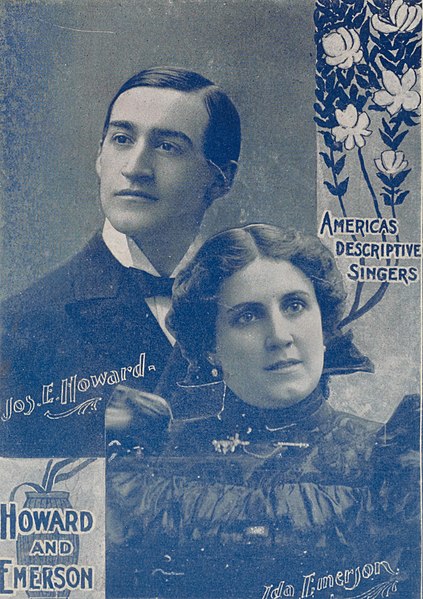Hello! Ma Baby
Ida Emerson, Joseph E. Howard, 1899 |

 |
What clues do the lyrics of the first verse give about the state of the phone system? Poor sound quality; operator-assisted calls; male operators. How routine has the telephone become in this song—was it a novelty or common? |
 |
The phone was invented in the 1870s. Why did it take so long to become a household appliance? What challenge did the telephone face in its early decades? It had to be adopted by enough people that there was someone on the other end to call. Telephone poles and wires had to be erected. Who were early adopters? Businesses. Many people had their first phone experiences with public telephones. Would the situation in this song have been possible with a public phone? |
 |
How was the telephone different from the telegraph in getting started? Telegraphs had central offices along the lines, required a trained operator who knew Morse code; telephones could be used by anyone with a voice, but required a complicated switching system to route calls to their destinations. |
 |
What other technologies required widespread adoption to be practical? Radio, television, digital television, two-way radio, email, social media, text. |
 |
What recent trend does this song remind you of? Remote work, school, and communication via internet platforms such as Zoom. How are internet relationships similar to the one in this song? How is phone conversation different than online communication? |
|

"Hello! Ma Baby" performed by Joan Morris and William Bolcom on Moonlight Bay: Songs As Is and Songs As Was, Albany Records, © 2006. Available on iTunes and on Spotify and YouTube.
For more information on Joan Morris and William Bolcom, visit their website.
A recording of historical interest is Len Spencer's from 1899 available at the Library of Congress.
|

View the lyrics for "Hello! Ma Baby."
View the published score.
|
|
 Joseph Howard (1867–1961) was a successful vaudeville singer who often toured with Ida Emerson as his partner. Howard often utilized trendy features in his songs to make them popular. In the case of this song, Howard capitalized on ragtime, which was immensely popular at the turn of the century, both in musical characteristics and textual references. Typical of ragtime is the syncopated rhythm, seen in this song particularly in the chorus in a short-long-short pattern. The lyrics of this song are in African American dialect, seen in the use of “ma” for “my” and “gal for “girl.” The dialect connects this song to blackface minstrelsy, which was still popular in these years. Joseph Howard (1867–1961) was a successful vaudeville singer who often toured with Ida Emerson as his partner. Howard often utilized trendy features in his songs to make them popular. In the case of this song, Howard capitalized on ragtime, which was immensely popular at the turn of the century, both in musical characteristics and textual references. Typical of ragtime is the syncopated rhythm, seen in this song particularly in the chorus in a short-long-short pattern. The lyrics of this song are in African American dialect, seen in the use of “ma” for “my” and “gal for “girl.” The dialect connects this song to blackface minstrelsy, which was still popular in these years.
 |
| Ida Emerson and Joseph E. Howard |
This song exemplifies what Jon Finson describes as an "astonished bemusement about the possibilities of the new technology" (Finson, pp. 148-49). Another example of how modern technology amazed the public is seen in "Henry's Made a Lady Out of Lizzie" in this unit and other songs like "Come Josephine in My Flying Machine," "He'd Have to Get Under, Get Out and Get Under (to Fix Up His Automobile)," and "My Merry Oldsmobile." |

Compare this song to:
"Henry's Made a Lady Out of Lizzie" (in this unit)
"Information Undertow" (Unit 9) |
|


